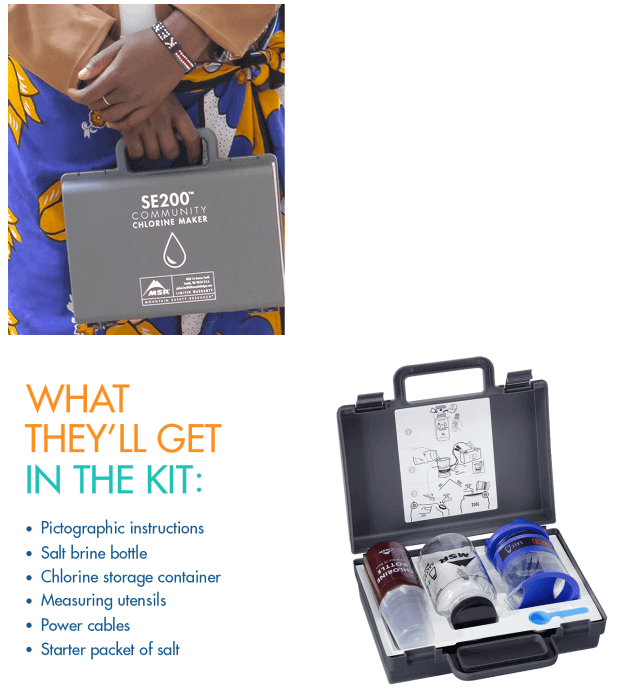Water is fundamental to health, but 1.8 billion people in the world drink from contaminated sources. This makes water sanitation among the most pressing global health priorities.
A new initiative aims to provide 500,000 people in the developing world with safe drinking water by 2017 through brilliantly simple proprietary technology backed by cutting-edge design, collaboration and financing.
Seattle-based MSR, a maker of high-tech mountaineering gear that is part of Cascade Designs, is mounting the effort with global nonprofits World Vision, Operation Blessing and PATH. Over the past 10 years, MSR has perfected a foolproof system called the SE200 Community Chlorine Maker. The device uses water, salt and power source such as a car battery to make chlorine, and the process takes only five minutes.
In October, MSR launched a crowdfunding campaign aimed at raising $50,000 to deploy 2,500 of the devices by the end of 2017 through World Vision and Operation Blessing.
Development of the device began about 10 years ago when Seattle-based global health nonprofit PATH came to MSR with the challenge of identifying the best way to decontaminate clean water in impoverished areas.
MSR, which harnessed its manufacturing and engineering expertise and experience making water purification systems for backpackers, explored 85 different technologies, MSR marketing head Jane Mauser said.
The team concluded chlorine was the best solution because it is portable, long lasting, inexpensive and effective at killing bacteria, viruses and protozoa that cause diarrheal disease.
Once that was decided, the design process focused on achieving an extremely simple device with no need for measuring or written instructions. The team went through iterations and decided the best size was a system for about 200 people.
“Our focus was low cost so we wanted to take all the bells and whistles off,” said Brian Gower of World Vision. But after testing with communities in the field, they added a bell to notify when the chlorine was ready (so that busy users could attend to other work) and a power indicator.
Villagers add salt and water based on lines on the side of the clear chamber. The process starts with a push of a button, and the device corrects to make the same concentration of chlorine every time.
“It’s magic – salt, water and electricity make chlorine. It blows people’s minds all the time,” said Jesse Schubert of PATH.
“The ease of use and the effectiveness of the treatment are things we love,” said Gower.
MSR sells the chlorine makers for $239, and charities get funding from donors to buy them. The devices have a stated lifespan of five years, but units in the field are going strong at seven years old.
By working with the charities, MSR understood user needs better and get feedback on early models. The charities also provide training and support as devices are deployed.
The partners see a need for a larger system that could be used for thousands of people in refugee camps, larger communities and disaster areas, so that may be on the horizon.
“We have learned that partnership is powerful,” said Mauser of MSR.






